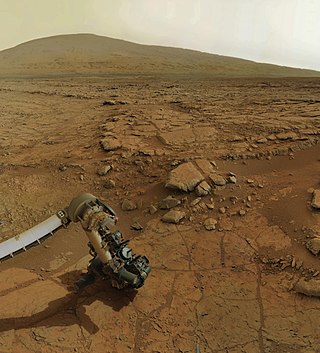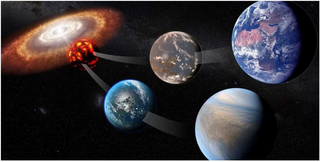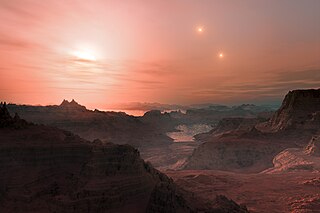
Astrobiology is a scientific field within the life and environmental sciences that studies the origins, early evolution, distribution, and future of life in the universe by investigating its deterministic conditions and contingent events. As a discipline, astrobiology is founded on the premise that life may exist beyond Earth.

The Drake equation is a probabilistic argument used to estimate the number of active, communicative extraterrestrial civilizations in the Milky Way Galaxy.
Extraterrestrial life, or alien life, is life that originates from another world rather than on Earth. No extraterrestrial life has yet been scientifically conclusively detected. Such life might range from simple forms such as prokaryotes to intelligent beings, possibly bringing forth civilizations that might be far more, or far less, advanced than humans. The Drake equation speculates about the existence of sapient life elsewhere in the universe. The science of extraterrestrial life is known as astrobiology.

The Fermi paradox is the discrepancy between the lack of conclusive evidence of advanced extraterrestrial life and the apparently high likelihood of its existence. Those affirming the paradox generally conclude that if the conditions required for life to arise from non-living matter are as permissive as the available evidence on Earth indicates, then extraterrestrial life would be sufficiently common such that it would be implausible for it not to have been detected yet.

In planetary astronomy and astrobiology, the Rare Earth hypothesis argues that the origin of life and the evolution of biological complexity, such as sexually reproducing, multicellular organisms on Earth, and subsequently human intelligence, required an improbable combination of astrophysical and geological events and circumstances. According to the hypothesis, complex extraterrestrial life is an improbable phenomenon and likely to be rare throughout the universe as a whole. The term "Rare Earth" originates from Rare Earth: Why Complex Life Is Uncommon in the Universe (2000), a book by Peter Ward, a geologist and paleontologist, and Donald E. Brownlee, an astronomer and astrobiologist, both faculty members at the University of Washington.

In astronomy and astrobiology, the habitable zone (HZ), or more precisely the circumstellar habitable zone (CHZ), is the range of orbits around a star within which a planetary surface can support liquid water given sufficient atmospheric pressure. The bounds of the HZ are based on Earth's position in the Solar System and the amount of radiant energy it receives from the Sun. Due to the importance of liquid water to Earth's biosphere, the nature of the HZ and the objects within it may be instrumental in determining the scope and distribution of planets capable of supporting Earth-like extraterrestrial life and intelligence.

Planetary habitability is the measure of a planet's or a natural satellite's potential to develop and maintain an environment hospitable to life. Life may be generated directly on a planet or satellite endogenously. Research suggests that life may also be transferred from one body to another, through a hypothetical process known as panspermia. Environments do not need to contain life to be considered habitable nor are accepted habitable zones (HZ) the only areas in which life might arise.
Peter Douglas Ward is an American paleontologist and professor at the University of Washington, Seattle, and Sprigg Institute of Geobiology at the University of Adelaide. He has written numerous popular science works for a general audience and is also an adviser to the Microbes Mind Forum. In 2000, along with his co-author Donald E. Brownlee, he co-originated the term Rare Earth and developed the Medea hypothesis alleging that multicellular life is ultimately self-destructive.
James Fraser Kasting is an American geoscientist and Distinguished Professor of Geosciences at Penn State University. Kasting is active in NASA's search for habitable extrasolar planets. He is considered a world leader in the field of planetary habitability, assessing habitable zones around stars. He was elected a member of the National Academy of Sciences in 2018. Kasting also serves on the Advisory Council of METI.

Neocatastrophism is the hypothesis that life-exterminating events such as gamma-ray bursts have acted as a galactic regulation mechanism in the Milky Way upon the emergence of complex life in its habitable zone. It is one of several proposed solutions to the Fermi paradox since it provides a mechanism which would have delayed the advent of intelligent beings in local galaxies near Earth.

The biological and geological future of Earth can be extrapolated based on the estimated effects of several long-term influences. These include the chemistry at Earth's surface, the cooling rate of the planet's interior, gravitational interactions with other objects in the Solar System, and a steady increase in the Sun's luminosity. An uncertain factor is the influence of human technology such as climate engineering, which could cause significant changes to the planet. For example, the current Holocene extinction is being caused by technology, and the effects may last for up to five million years. In turn, technology may result in the extinction of humanity, leaving the planet to gradually return to a slower evolutionary pace resulting solely from long-term natural processes.

An Earth analog, also called an Earth twin or second Earth, is a planet or moon with environmental conditions similar to those found on Earth. The term Earth-like planet is also used, but this term may refer to any terrestrial planet.

Gliese 667 Cc is an exoplanet orbiting within the habitable zone of the red dwarf star Gliese 667 C, which is a member of the Gliese 667 triple star system, approximately 23.62 light-years away in the constellation of Scorpius. The exoplanet was found by using the radial velocity method, from radial-velocity measurements via observation of Doppler shifts in the spectrum of the planet's parent star. Gliese 667 Cc is sometimes considered as the first confirmed exoplanet with a high prospect for habitability.

Kepler-62f is a super-Earth exoplanet orbiting within the habitable zone of the star Kepler-62, the outermost of five such planets discovered around the star by NASA's Kepler space telescope. It is located about 982 light-years from Earth in the constellation of Lyra.

In astrobiology and planetary astrophysics, the galactic habitable zone is the region of a galaxy in which life is most likely to develop. The concept of a galactic habitable zone analyzes various factors, such as metallicity and the rate and density of major catastrophes such as supernovae, and uses these to calculate which regions of a galaxy are more likely to form terrestrial planets, initially develop simple life, and provide a suitable environment for this life to evolve and advance. According to research published in August 2015, very large galaxies may favor the birth and development of habitable planets more than smaller galaxies such as the Milky Way. In the case of the Milky Way, its galactic habitable zone is commonly believed to be an annulus with an outer radius of about 10 kiloparsecs (33,000 ly) and an inner radius close to the Galactic Center.

The theorized habitability of red dwarf systems is determined by a large number of factors. Modern evidence suggests that planets in red dwarf systems are unlikely to be habitable, due to high probability of tidal locking, likely lack of atmospheres, and the high stellar variation many such planets would experience. However, the sheer number and longevity of red dwarfs could likely provide ample opportunity to realize any small possibility of habitability.

Kepler-442b is a confirmed near-Earth-sized exoplanet, likely rocky, orbiting within the habitable zone of the K-type main-sequence star Kepler-442, about 1,196 light-years (367 pc) from Earth in the constellation of Lyra.

A superhabitable world is a hypothetical type of planet or moon that is better suited than Earth for the emergence and evolution of life. The concept was introduced in a 2014 paper by René Heller and John Armstrong, in which they criticized the language used in the search for habitable exoplanets and proposed clarifications. The authors argued that knowing whether a world is located within the star's habitable zone is insufficient to determine its habitability, and that the prevailing model of characterization was geocentric or anthropocentric in nature. Instead, they proposed a biocentric model that prioritized characteristics affecting the abundance of life and biodiversity on a world's surface.

Rare Earth: Why Complex Life Is Uncommon in the Universe is a 2000 popular science book about xenobiology by Peter Ward, a geologist and evolutionary biologist, and Donald E. Brownlee, a cosmologist and astrobiologist. The book is the origin of the term 'Rare Earth Hypothesis' which denotes the central claim of the book: that complex life is rare in the universe.

The following outline is provided as an overview of and topical guide to extraterrestrial life:














